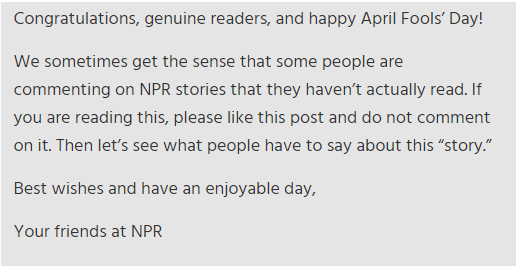Welcome to another blog post on fake news. We here at the library want you as savvy about what you read online as we try to be. None of us want to be fooled by fake news! It's a good goal for all of us to seek the truth so we can make informed decisions about the world around us.
Today's topic is Reading Beyond the Title and I'm going to start with a story. A few years ago, NPR posted the following headline on their roster of news articles:

Instant outrage! Multitudes of commentary! Scores of folks shared the article across all platforms of social media. "I read every day!" cried some, while others listed every book and article they had recently read. I can remember feeling very indignant myself when I saw the article cycling through my morning newsfeed (I'm just a teensy bit of a book nerd). 'Of course people read,' I thought.
What I should have done is two things. The first was to pay attention to the date (April 1). The second was to click on to the article itself instead of just reading the title. When I finally did so, this is what I saw.

Although this example was an April Fool's prank, simply reading the title of an article and then sharing or commenting is common behavior. I know I have certainly done it. When I'm at home relaxing, I don't always spend the time I should checking my sources. I'm off the clock, right? Wrong. Fake news never takes a break and neither can we. When it comes to headlines and titles, here are a few things you can do to combat fake news.
- Be VERY suspicious of sensational headlines. You'll Gasp When You See This Evidence..., You MUST SEE This New Story...,The Effect of This New Ingredient Is Unreal.., The Politician Flipped When They Saw This... We've all seen these sorts of titles scattered across the internet. When you see headlines that use sensational and provocative language or that are BEGGING you to click on them, chances are strong the accompanying articles are bogus, fake or clickbait.
- Always read beyond the headline. Even legitimate news sources will sometimes use misleading headlines. As you're reading the article, ask yourself if the content matches the headline. If there are clues whether an article is fake or not, there are going to be more of them in the body of the article, not the title. Read beyond the headline and decide for yourself.
- Check your emotional reaction. When we are angry or upset, people tend to react without thinking. If we see a headline that makes us outraged, chances are we'll react (share, comment, retweet) without examining the article too closely. It's one of the hardest things to do - and I say this as someone who struggles with it - but if you see something that REALLY makes you mad, take a deep breath and check the source thoroughly.
Hope that gives you some more fake news pointers! Be sure to check back with us for more ways to avoid getting fooled by fake news.
Don't want to miss the next installment? Be sure to follow the library on Facebook, opens a new window and Twitter, opens a new window or search our website for blog posts with the keyword 'Fake News'.

